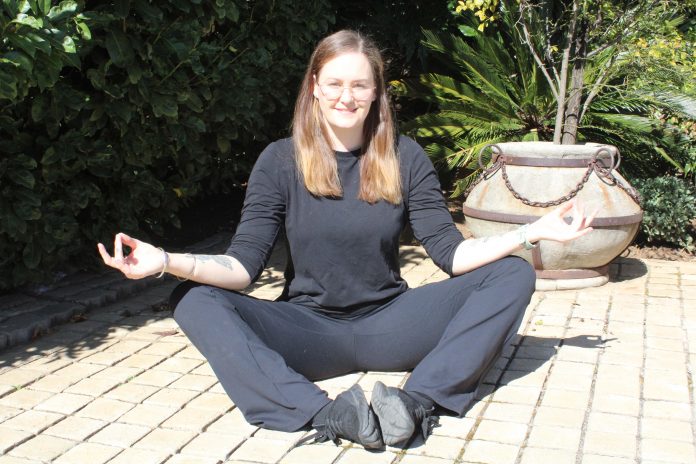Step into the vibrant world of Keeta Partridge, a 34-year-old former foundation phase teacher, Yoga-Nastics teacher, Pilates instructor, and aspiring cognitive behavioural life coach from Brackenhurst. Keeta’s journey is one of passion, discipline, and a relentless pursuit of personal growth.
In a world where children face numerous challenges, Keeta Partridge has taken it upon herself to equip them with the tools needed to overcome life’s obstacles. Through her innovative movement-based programme, Yoga-Nastics, Keeta is empowering children to harness the power of their breath while strengthening their minds and bodies.
With a deep passion for inspiring self-confidence and resilience, Keeta has been running Yoga-Nastics for about two years, making a meaningful impact on children’s lives.
A passion like no other
Yoga-Nastics not only focuses on physical development but also nurtures children’s mental well-being. By engaging in this unique programme, children experience a range of benefits, including improved concentration, enhanced memory, increased strength and flexibility, heightened self-awareness, improved self-control, and a boost in self-esteem.
Through a combination of movement, songs, breathing techniques, storytelling, sensory play, crafts, emotional regulation, and mindfulness, Keeta creates a holistic and child-friendly environment.
One of the most rewarding aspects of Keeta’s work is witnessing the growth of children’s self-confidence. Seeing children blossom and thrive is a testament to the power of Yoga-Nastics.
However, she acknowledges that introducing something entirely new can pose challenges. Educating people about the concept and gaining their openness and understanding has been her most significant hurdle. Despite this, Keeta remains dedicated to her mission, striving to spread the transformative power of Yoga-Nastics far and wide.
Breathing techniques, such as the bumble bee breath, teach children how to regulate their breath and find inner calmness. Emotional regulation is consistently emphasised throughout the classes, helping children identify their emotions, understand their bodily sensations, and learn strategies for managing strong emotions. Sensory play and crafts promote mindfulness and help children focus their attention on the present moment.
Working with children between the ages of 4 and 12, Keeta finds this age group to be the most receptive to new experiences and the ones who benefit the most from the concepts presented. While Yoga-Nastics can benefit children of all ages, she particularly enjoys working with this age group.
Drawing from her educational background, which includes a B.Ed. in the Foundation Phase and an Honours in School Guidance and Counselling, Keeta highlights that Yoga-Nastics complements traditional schooling by addressing crucial aspects of children’s mental health.
One of the most significant transformations she witnesses in her students is their willingness to persist and improve, even in areas where they initially struggle. This invaluable life lesson, not giving up on oneself, instills resilience and humility in children who may otherwise feel pressured to be perfect. ‘By creating an environment where rules are understood, and children feel loved and accepted, I set high expectations for my students, encouraging them to always try their best regardless of the situation.’
More than just Yoga-Nastics
For Keeta, success is not defined by a single story or moment. Instead, it is the collective growth and increased self-confidence she observes in her students that fuel her passion. Hearing children express their love for attending Yoga-Nastics or receiving feedback from parents about their child’s ability to utilise the techniques during overwhelming moments brings her immense joy.
‘Witnessing a child’s face light up when they accomplish a challenging pose reaffirms the significance of my work,’ she says.
Keeta’s vision extends beyond individual classes; she aspires to introduce the programme to as many schools as possible, ensuring that every child can benefit from its life-enriching principles. Additionally, Keeta plans to conduct workshops for parents and teachers, sharing valuable insights and practical ideas for incorporating Yoga-Nastics into classrooms and homes.
The benefits of Yoga-Nastics are vast and encompass improved focus, concentration, and self-awareness, as well as support for children with ADHD, autism, and weak fine and gross motor skills. Furthermore, the programme strengthens core muscles, vital for proper sitting in class, enhances children’s ability to self-soothe, and boosts self-confidence.
Keeta and her Yoga-Nastics programme stand as a beacon of hope, empowering children to become their own superheroes. By imparting essential life skills and fostering resilience, she is shaping the future generation to be confident, well-equipped individuals capable of overcoming any challenge that comes their way. To enroll your children in Yoga-Nastics, parents can contact Keeta via WhatsApp at 082 356 7572 or email her at [email protected].
She offers a free trial class, providing an opportunity for everyone to experience the transformative power of Yoga-Nastics.
This and that
She was born and raised in Johannesburg South and has called Brackenhurst her home for most of her life. Growing up alongside her older brother, who is now a motor mechanic, she developed a strong bond and cherished their close relationship.
Reminiscing about her childhood, Keeta’s fondest memory is her time spent at gymnastics. It was a place where she felt a sense of belonging and joy, shaping her love for movement and physical activity.
Today, Keeta resides in the same house she has called home for the past 25 years, living with her mother and brother. Her educational journey led her through Kenton Primary and Bracken High School, setting the stage for her future endeavors.
After matriculating, she embarked on a path to become a teacher through Unisa. Working as a student teacher, she gained practical experience while pursuing her four-year degree. Keeta’s passion for teaching soon extended beyond traditional academics, leading her to explore the world of Pilates and Yoga-Nastics.
Currently single, her daily life is a dynamic mix of teaching Pilates and Yoga-Nastics classes, delving into studies to become a cognitive behavioural life coach, and maintaining an active social media presence.
Embracing variety, she finds joy in knitting, practicing yoga, working out, and taking care of her 12 beloved pets, showering them with love and affection.
Beyond her active pursuits, Keeta is an avid MotoGP and F1 enthusiast, indulging in the exhilaration of high-speed racing. Her passions extend to reading, gardening, and nurturing her collection of house plants, constantly striving to keep them thriving.
‘I draw inspiration from observing others who are passionate about their craft, be it artists, musicians, or creative individuals. Their dedication fuels my own desires to infuse creativity into every aspect of my life.’
If she could change anything about the world, Keeta dreams of a society where individuals find contentment in who they are while continuously pursuing their fullest potential.
TIPS:
Essential tips for parents
Parenting can be both rewarding and challenging, especially when it comes to nurturing your child’s emotional well-being. In a world filled with distractions, it is essential for parents to prioritise meaningful connections and teach their children valuable skills to navigate their emotions. Here are some expert tips to help parents foster emotional intelligence and mindfulness in their children:
- Look at your children in their eyes when they talk to you: Eye contact demonstrates active listening and shows your child that their thoughts and feelings are valued. By giving them your full attention, you create a safe space for open communication and strengthen your bond.
- Get down on their level: Physically positioning yourself at your child’s eye level, especially when they are sharing something important or seeking comfort, helps them feel seen and understood. This simple act promotes a sense of connection and reinforces that their feelings are valid.
- Teach your children acceptable ways to calm their big emotions: Empower your child with effective coping strategies for managing strong emotions. Encourage them to engage in activities such as listening to calming music, asking for a hug, squeezing a soft object, talking about their feelings, counting to 10, or taking deep breaths. These techniques promote self-regulation and provide them with healthy outlets for emotional expression.
- Encourage mindfulness as often as possible: Introduce mindfulness practices into your child’s daily routine. For example, during mealtime, invite them to take a moment to appreciate the colours, smells, and textures of their food. By engaging their senses, you cultivate their ability to be fully present and attentive to the world around them.
- Model the behavior you want to see from your child: Children learn by observing their parents’ actions. Be mindful of how you manage your own emotions and strive to model healthy emotional responses. By demonstrating patience, empathy, and self-control, you provide your child with an invaluable example to follow.
- Discuss emotions daily: Don’t wait for a meltdown or challenging situation to address emotions. Regularly engage in conversations about feelings with your child. Ask them how their day went, what made them happy or sad, and encourage them to express themselves openly. By normalising emotional discussions, you create a safe environment where they can freely explore their emotions.
- Involve your children in daily tasks: Promote a sense of responsibility and importance in your child’s life by involving them in daily tasks. Tasks like setting the table, making a shopping list, watering plants, or preparing their clothes for the next day give children a sense of contribution and belonging. Through these responsibilities, they develop maturity and self-confidence.
Remember, nurturing emotional well-being is an ongoing process that requires patience and consistent effort. By implementing these tips into your daily interactions with your child, you lay the foundation for their emotional intelligence and create a harmonious parent-child relationship. Through connection, mindfulness, and shared responsibilities, you empower your child to navigate their emotions confidently and thrive in all areas of their lives.
Text and photo: ELZAAN PIENAAR






